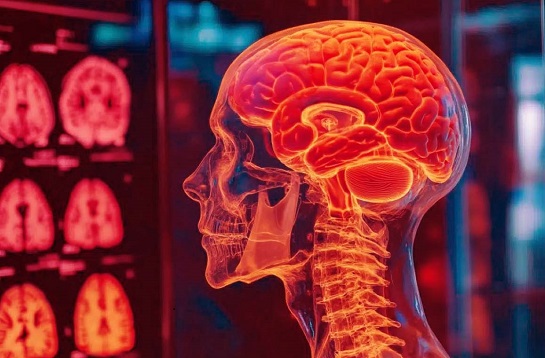Nikhil Prasad Fact checked by:Thailand Medical News Team Oct 17, 2025 1 month, 2 weeks, 5 days, 6 hours ago
Medical News: Lingering Damage Inside the Brainstem
A groundbreaking study by researchers from the University of Cambridge and the University of Oxford has revealed that individuals who were hospitalized for severe COVID-19 show lingering chemical changes in the brainstem months after recovery. Using ultra-high field 7-Tesla magnetic resonance spectroscopy (MRS), scientists discovered that inflammation markers in the brainstem were linked to disease severity and ongoing mental health issues. The collaborative research, part of the Cambridge NeuroCOVID Group and the CITIID-NIHR COVID-19 BioResource Collaboration, sheds light on how COVID-19 may cause long-term neurological and psychological symptoms. In this
Medical News report, the study’s results provide important insight into how SARS-CoV-2 may leave persistent effects deep in the brain even after apparent recovery.
 COVID-19 Linked to Long Lasting Brainstem Inflammation
Advanced Imaging Reveals Subtle Neurochemical Changes
COVID-19 Linked to Long Lasting Brainstem Inflammation
Advanced Imaging Reveals Subtle Neurochemical Changes
The study involved 34 patients who had been hospitalized with COVID-19 and 15 healthy individuals without prior infection. Using state-of-the-art 7T MRS scans, researchers measured neurochemical profiles at the ponto-medullary junction, a vital brainstem area responsible for breathing and consciousness regulation. The team observed that higher blood inflammation levels—measured through C-reactive protein (CRP)—strongly correlated with increased concentrations of myo-inositol, a compound associated with neuroinflammation and glial cell activity.
Elevated choline levels, often linked to membrane turnover and inflammation, were also observed. Interestingly, while overall metabolite levels did not differ significantly between patients and controls, those with more severe disease and poorer mental health exhibited distinct chemical signatures, suggesting ongoing neuroinflammation and stress-related responses in the brainstem.
Link Between Inflammation and Mental Health Symptoms
Beyond physical health, the study uncovered a link between mental well-being and neurochemical balance. Patients who reported anxiety, fatigue, and emotional distress months after hospitalization also showed higher myo-inositol concentrations in the brainstem. This finding supports theories that COVID-19-induced inflammation in brain structures controlling mood and cognition may drive symptoms such as depression and brain fog. According to the research team, myo-inositol acts as a glial marker indicating brain immune activation, while elevated choline reflects neuroinflammatory processes. These combined effects could explain why many post-COVID-19 individuals continue to suffer from lingering mental health and neurological problems even when no clear brain lesions are detected on standard scans.
Challenges and Future Research Directions
The researchers acknowledged certain limitations, including small sample sizes and differences between MRI equipment at the two study sites, which may have affected sensitivity. However, the high-quality imaging achieved in over 90% of participants d
emonstrates that advanced 7T brainstem spectroscopy is feasible in clinical research. The study emphasizes that long-term COVID-19 symptoms may not result from structural brain damage but from ongoing biochemical and inflammatory disturbances at a microscopic level. Further studies will aim to confirm these findings and explore therapeutic approaches to reduce neuroinflammation in long-COVID patients.
Conclusion
The new evidence suggests that the severity of initial COVID-19 infection directly influences lingering neuroinflammation within the brainstem, potentially contributing to fatigue, anxiety, and other long-term symptoms. The correlation between elevated inflammatory markers, altered brain chemistry, and poor mental well-being underscores that COVID-19 is not just a respiratory disease but a complex systemic illness with deep neurological implications. Understanding these brainstem changes could open doors to treatments that target inflammation, improving recovery outcomes for millions affected by long COVID.
The study findings were published in the peer reviewed journal: Frontiers in Neuroscience.
https://www.frontiersin.org/journals/neuroscience/articles/10.3389/fnins.2025.1617709/full
For the latest COVID-19 News, keep on logging to Thailand
Medical News.
Read Also:
https://www.thailandmedical.news/news/breaking-long-covid-individuals-found-to-have-a-disruption-in-the-critical-brain-bridge-linking-the-brainstem-and-cerebellum
https://www.thailandmedical.news/news/afobazole-can-prevent-respiratory-failure-caused-by-sars-cov-2-attacking-the-brainstem
https://www.thailandmedical.news/news/neuroinflammation-in-the-brainstem-and-its-link-to-pots-and-long-covid
